Book Review: Finding Flow by Mihaly Csikszentmihalyi
I’m intrigued by the idea of flow. I’m certain that I chose graphic design as a career because getting lost in my work brings me into the flow state. When I was a child, my father called me a macher, which is German for “maker.” I am still happiest when I am making something.
In his book Finding Flow, Mihaly Csikszentmihalyi (me-HIGH chick-sent-me-HIGH) defines flow as moments when “there is no room in your awareness for conflicts or contradictions. When heart, will, and mind are on the same page.” After studying hundreds of people, he learned that most of us are likely to find flow at work than anywhere else.
Other times you might find yourself in flow are while playing sports, playing music, cooking, or hanging with friends. You are least likely to find flow when consuming passive entertainment.
So why do we consume so much passive entertainment? Because the flow state usually comes with a high entry fee. Let’s say you find flow when swimming. You have to drive to the pool, change into your swim togs, and endure the first plunge into cold water. After your swim you have to shower, change, and drive back to your home or office. It’s easier to sit back with Netflix.
There’s a yoga class that I love every Thursday at 4:15 pm. Most of the time I don’t feel like I have the energy for it. (The class is called Core Power Yoga Sculpt, which involves yoga with hand weights and a cardio burst halfway through.) But it’s on my calendar and I go. The instructor bounds into class and starts the music. We begin to move slowly, warming up. Soon I am pushed to my physical limit, the whole class feeding on each others’ energy. After it’s over I’m always glad I went. I have experienced flow.
Maximizing Time Spent in Flow
Is it possible to live in a state of flow? No, but we can maximize the amount of time we spend there by understanding it. Furthermore, we can live more excellent lives, freed from worry and anxiety, by knowing how to move ourselves into a flow state. It has nothing to do with wealth, fame, or awards.
In a study of adolescents done by Joe Hektner, 60% reported the same frequency of flow in a typical week two years apart. But 20% reported an increase in flow precipitated by studying more and vegging less. This group reported high levels of concentration, self-esteem, and enjoyment.
Outside of work is where you have the most opportunity to change circumstances. Take a class, start a new hobby, or simply read more.
Csikszentmihalyi establishes that “time is the ultimate scarce resource.” Yet we all have exactly the same amount of time each day. By studying a group of people of differing by age, gender, and social class, he found that, outside of sleep:
- People spend 24–60% of their time in productive activities such as work, school, and daydreaming
- People spend 20–42% of their time in maintenance activities such as housework, grooming, and driving
- People spend 20–43% of their time in leisure activities such as watching TV, hobbies, sports, socializing, and resting
The wide ranges account for the wide range of individuals in the study. And yes, Csikszentmihalyi considers daydreaming a productive activity!
Moving into Flow
Generally, we arrange our lives to pursue happiness. We pursue money and notoriety because we think these things will make us happy. Some studies show that billionaires are only a tiny bit happier than those with average incomes. Personal qualities are more likely to determine happiness. Even then, two people in the same circumstances will report different levels of happiness. More important than feeling happy in any given moment is the active pursuit of meaningful goals.
“If one fails to develop goals that give meaning to one’s existence, if one does not use the mind to its fullest, then good feelings fulfill just a fraction of the potential we possess.”
Our goals determine our sense of self and who we become. To pursue goals takes mental effort. The less we like what we are doing, the more easily we become distracted and never reach our goal. “But when a person likes what he does and is motivated to do it, focusing the mind becomes effortless.” That describes the state of flow.
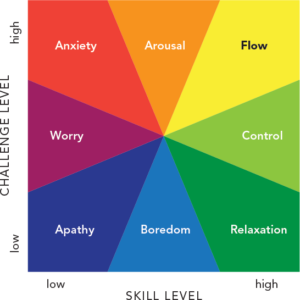 In the accompanying chart, you can see the relationship between challenge and skill levels. When you don’t have the skills to meet your challenges, you become worried or anxious. When you’re overqualified for the task, you become bored. Using this chart, you can see that adjusting your challenge or your skill level is how to achieve flow more often.
In the accompanying chart, you can see the relationship between challenge and skill levels. When you don’t have the skills to meet your challenges, you become worried or anxious. When you’re overqualified for the task, you become bored. Using this chart, you can see that adjusting your challenge or your skill level is how to achieve flow more often.
Peak experiences have a clear goal, provide feedback about your progress, and require you to perform at the top of your ability. In the state of flow, time passes without notice. You might find hours pass before you realize it.
Csikszentmihalyi says that flow, not happiness, is necessary for an excellent life. Happiness is fleeting, but flow leads to growth.
Relationships
Relationships are an opportunity for flow, as long as you put psychic energy into them. Sharing an activity, inside jokes, and common goals build strong relationships. Csikszentmihalyi quotes a man who reads with his young daughter. Sometimes she reads to him, sometimes he to her. At those times, he is totally absorbed in the moment.
Each culture in the world has a different structure for interacting with others. Within those structures, interacting with other people carries both risks and rewards. By investing your own psychic energy in another person, you risk rejection. By finding out the other person’s immediate goals and contributing to them, you gain connection, conversation, possibly friendship, and a chance for flow.
I have never understood why some families primarily drink and talk about politics when they get together. Those evenings always end up in a fight. My family plays games. Playing a game gives everyone a goal, challenges our skill levels, allows plenty of opportunity for laughter, and connects us. In those times we find flow.
Follow Your Passion
You’ve heard the advice to follow your passion many times. Why is it repeated so often? Csikszentmihalyi says that, in his research, 15% of people report never being in a state of flow. Suffering deprivation or abuse as a child could understandably lead to a joyless life. Yet that is not the case.
One inspiring story is that of Linus Pauling, from an impoverished family in Portland, Oregon. He did hard, physical labor for spending money while attending Cal Tech on a scholarship. Later, he won the Nobel prize in chemistry. All his life he tackled every task with curiosity and enthusiasm. Says Pauling, “I just went ahead doing what I liked to do.” On the surface this seems self-indulgent. But it’s more about the attitude you bring to the task than the task itself. Even when splitting wood or mopping the kitchen, Pauling threw himself into the task with passion.
If you find yourself stuck in a boring job, Csikszentmihalyi suggests quitting and finding something better, even at the cost of financial hardship. If that is not possible, he suggests finding ways to bring new challenges into what you are already doing.
Flow and Creativity
Environment has an effect on creative flow. Many artists and scientists report that being in natural and awe inspiring places enhances their ability to break new ground. “Outings and vacations help to clear the mind, to change perspectives, to look at one’s situation with fresh eyes.” You can change your immediate surroundings by decluttering, organizing, and redecorating. I swear by a fresh coat of paint for uplifting a space.
Paradoxically, work provides the most opportunities for flow experiences, even though we generally think we would avoid work if we could. Hobbies and relationships also provide flow opportunities. It is in idleness and passive leisure that motivation, happiness, and self-esteem are lowest.
“Without the goal and the challenges usually provided by a job, only a rare self-discipline can keep the mind focused intensely enough to insure a meaningful life.”
Csikszentmihalyi goes on to say that the way to maximize your free time is to apply ingenuity and attention to it. Pursue your hobbies as you would a job. Express your best self. Without a boss or a client, you have complete creative freedom.
Creativity is enhanced by exchanging ideas with other people. Working in isolation can move you into the boredom and apathy areas. Peers provide the challenge that invigorates you back into a flow state.
Learn from Creative People
Artists and entrepreneurs do not follow a predetermined path. They make up their careers as they go along. The most successful ones bring experimentation and play to their work, and fail a lot. Small failures are not catastrophic, and one can learn from them. Never taking a risk almost certainly leads to failure, because you stand still while others pass you by.
In The Art of Possibility, authors Rosamund and Benjamin Zander suggest that every time you try something new, stand back and say of the result: “Isn’t that fascinating!” No judgment, nothing personal. Just new information that you can use going forward.
The Autotelic Person
From the Greek auto (self) and telos (goal) comes the word “autotelic,” meaning something we do for its own sake. If I run for the pure joy of running, that is an autotelic experience. If I run to win a race, that is exotelic.
An autotelic person does things primarily for the experience rather than a goal. Says Csikszentmihalyi, “An autotelic person needs few material possessions and little entertainment, comfort, power, or fame because so much of what he [or she] does is already rewarding.” He goes on to say, “They are more autonomous and independent, because they cannot be as easily manipulated with threats or rewards from outside.”
An autotelic person is more likely to spend time reading, studying, and participating in sports and hobbies. It’s possible for this person to spend as much as 70% of his/her waking hours in flow. Autotelic people report more concentration, enjoyment, self-esteem, and importance in their daily activities. But, surprisingly, they do not report more happiness.
Csikszentmihalyi posits that happiness is not the most important quality of an excellent life. Growth and meaning are more important. He notices that autotelic people do not hoard their psychic energy. They spend it freely without expecting any return. Curiosity and the delight of discovery are enough.
Creative people tend to be autotelic. They see the world with disinterest, in other words, without a personal agenda. It’s never too late to develop more curiosity, to pursue activities purely for the joy of them, and to do more of what you like to do. Csikszentmihalyi describes an 80-year-old man who rediscovered the state of flow that he had experienced briefly in his youth while playing polo.
How to Have More Flow in Your Life
- Develop the habit of concentrating on what you do
- Perform tasks with skill rather than by rote
- Do something you’ve had an interest in, but never before made the effort to do
- Spend one less hour watching TV each day and one more hour reading
- Put some energy into prioritizing, organizing, and streamlining your daily routine so you have more energy for novelty going forward
- Follow your curiosity
- Allow yourself to fail at something new
- Withhold psychic energy from negative experiences
- Take ownership of your actions: change “I must” to “I want”
- Let go of pursuing results—money, power, recognition—and do things for pure enjoyment
- But have a goal that makes the activity worth doing
___
To discover more about the state of flow and how to increase it in your life, read the book.
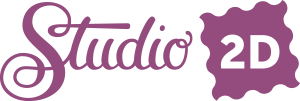
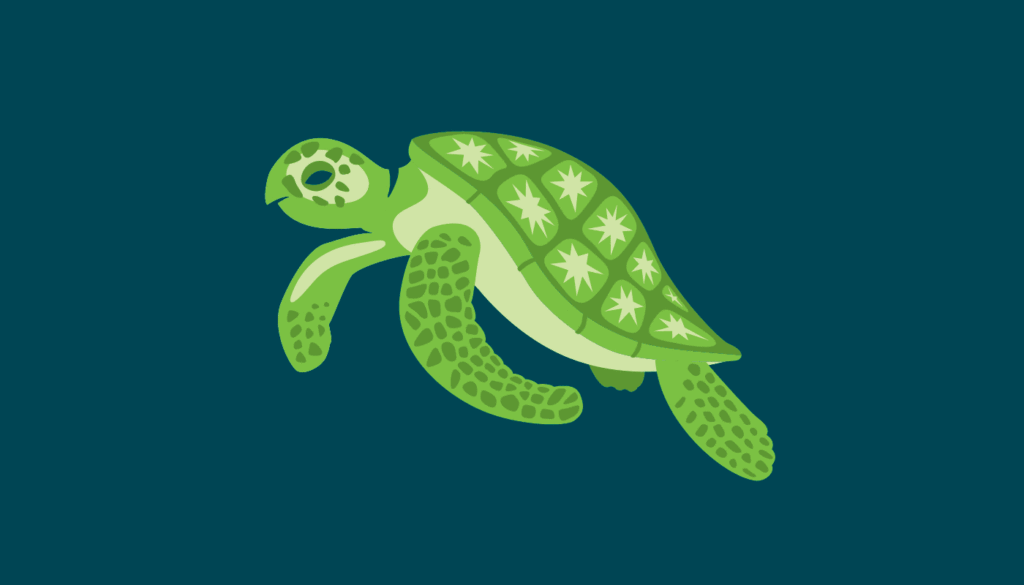


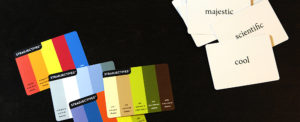


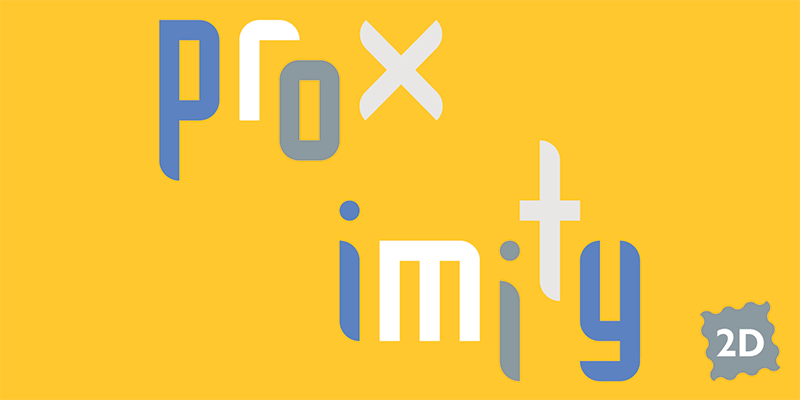
One Response
I resonant with this essay!